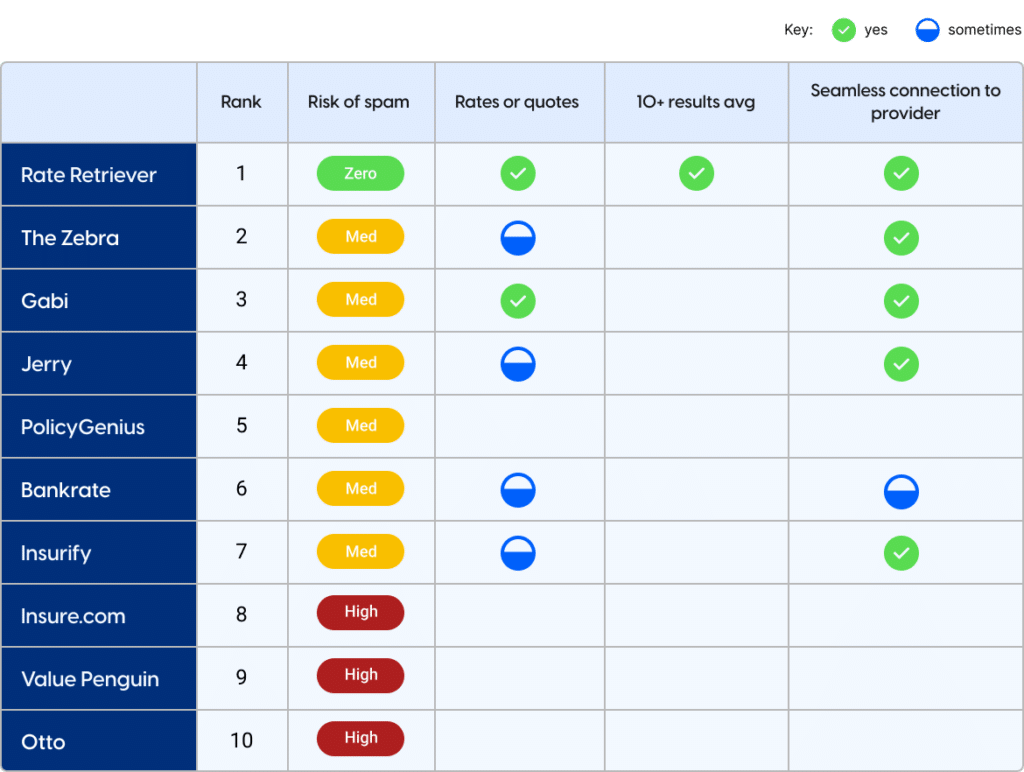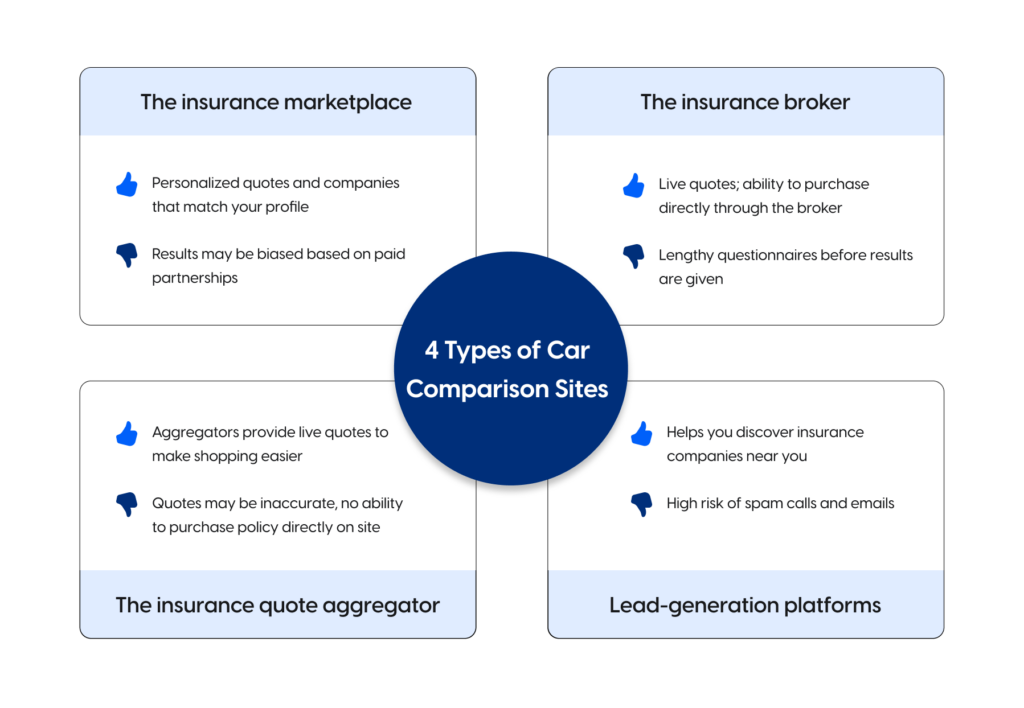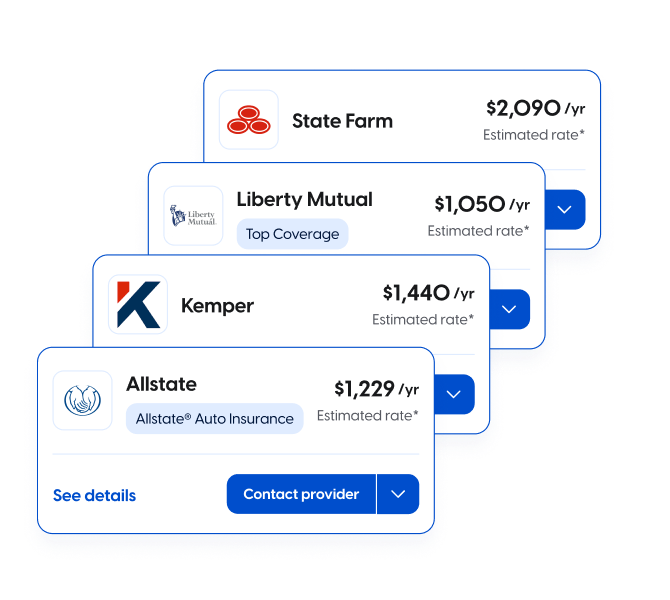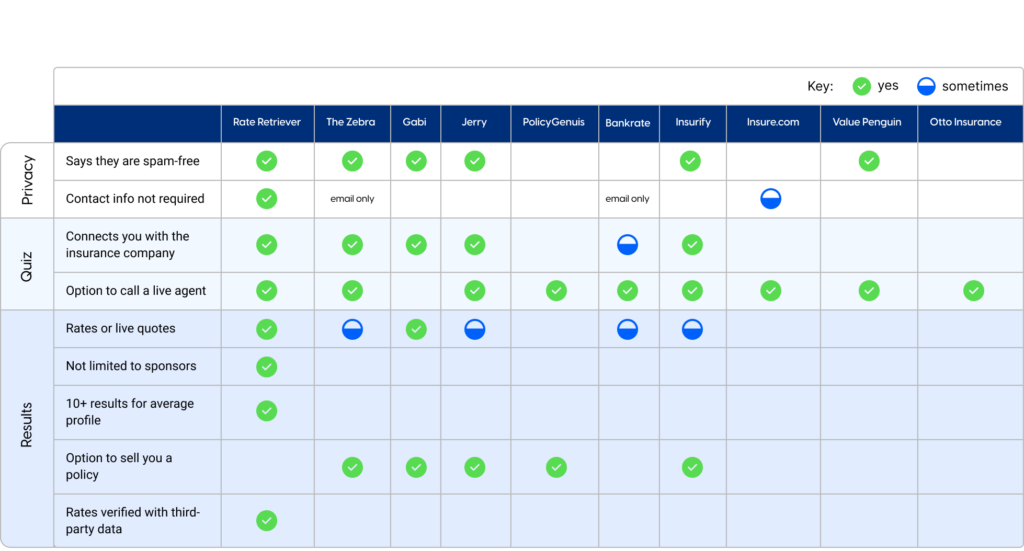Call a licensed agent: 833-964-9663
Home » Car insurance » How Car Insurance Comparison Sites Work
Comparing car insurance quotes can help you find the lowest rate. Learn the different types that are out there, and which sites offer you the best results.
Fetch the best rates for the right coverage, no sign up required!
"*" indicates required fields

Shopping for car insurance online can feel like an overwhelming process. There are so many insurance companies out there and each one will give you different rates based on several personal factors, so it can be difficult to even know where to begin. This is where car insurance comparison sites come into play.
Car insurance comparison tools exist to help you find the cheapest car insurance rate possible by allowing you to compare insurance companies side by side. Often, comparison sites display either direct quotes or rate estimates based on your answers to questions such as how old you are, what state you live in, and what type of car you drive.
However, not all car insurance comparison sites are created equal, and understanding all the different options out there is an essential part of finding your cheapest car insurance rate.
Want to compare 10+ rates now?
Start saving on car insurance in minutes.
No phone or email required. Seriously.
If you’re looking to compare car insurance companies side by side, there are four main types of comparison websites you might come across: insurance marketplaces, insurance brokers, quote aggregators, and lead-generation platforms. Each can help you find and compare insurance companies (usually for free, since most site owners make money through referrals of some kind), but each has its own strengths and weaknesses.

After you submit your unique driver profile, this kind of comparison site will display your personalized results, usually quotes or top companies that match your profile. This type of comparison tool makes money through referral links, so when you click on an insurance company’s website from the results page, the marketplace may earn a commission.
The very best of these tools will not require contact information to view your results, but for the ones that do, there is a risk of spam phone calls, emails, and text messages for the user.
Pros:
Cons:
Insurance brokers make money through commissions. Once the user fills out the questionnaire on the broker’s site, the broker will connect them with an agent who can recommend a provider. Every time a customer purchases a policy or clicks on a sponsored or affiliate link on the broker’s website, the broker gets paid.
Pros:
Cons:
Quote aggregators use a system called Rate Call 1 to offer consumers live quotes from the insurance companies that they partner with, but users only get those results after answering a fairly in-depth questionnaire. These types of comparison sites primarily rely on affiliate links to make their money, however, some of these sites also sell user contact information, making them high risk for spam.
Pros:
Cons:
Lead generation platforms collect your personal information, then show you ads for their sponsored partners in your location. Instead of getting matched with personalized rates or live quotes, these platforms primarily display ads. While these types of sites make a profit through affiliate and sponsor links, they also sell “lead data” (the information you submit in the questionnaire) to outside sources. This makes lead-generation sites incredibly high risk for spam.
Additionally, platforms that follow this model do not offer comprehensive results, as they only display ads for their sponsored insurers in your location instead of showing personalized rates or live quotes.
Pros:
Cons:
Rate Retriever: the true insurance comparison tool
Rate Retriever is a new kind of insurance comparison tool that doesn’t perfectly fit into any of the above categories. When we designed our tool, our goal was to create the only true insurance comparison tool on the market, and with Rate Retriever, we have done just that. Now, we’re aware that we might be a little biased on that front, but our customer reviews don’t lie.

Unlike an insurance marketplace, you cannot purchase a policy directly through Rate Retriever, rather our tool empowers you to independently research your insurance options and we’ll seamlessly connect you with the provider of your choice. We use third-party data to provide you with accurate and personalized rate estimates after answering just 5 quick questions. One of our core priorities when creating Rate Retriever was to keep our tool 100% spam free, so we never require any user contact information before displaying results.
Another foundation we built our tool on was complete transparency with our users. In the spirit of that, we’ll tell you that we do primarily make money through commissions gained when a user clicks on or calls one of our insurance provider partners. However, partnerships never (and we really do mean never) influence the information shared with users or limit the results displayed.
We combed through all the most well-known players in the insurance comparison space and ranked them so that you don’t have to. To reach our conclusion, we evaluated several factors including user experience, risk of spam, the variety and relevancy of results, and more.

Our own bias notwithstanding, based on our analysis of the most popular insurance comparison tools, Rate Retriever takes the top spot on our list. Our tool is fast and straightforward, only taking about 1-2 minutes to complete. Compared to the other tools we tested, Rate Retriever returned the most rate estimates for the average profile and didn’t redirect us to another site first. Lastly, we’re 100% spam-free (we don’t even ask for your contact info before showing you your rates).
Our favorite thing about Rate Retriever: Provided real rate estimates directly on the results page without requiring any user contact information.
Our least favorite thing about Rate Retriever: Results provided are only estimates, so your actual rate could look different.
#2 on our list is an insurance marketplace, The Zebra. This tool snags the second spot because it did not require a phone number before displaying results, and it gave a relatively large number of options at the end. If your profile matches what one of their insurance provider partners is looking for, you may see live quotes returned. However, The Zebra did not display quotes or rate estimates directly on the results page for most of the profiles we tested, rather it required the user to visit the provider’s page to view rates.
Our favorite thing about The Zebra: Displays a large number of results without requiring the user’s phone number.
Our least favorite thing about The Zebra: Does not offer any actual quotes or rate estimates on the results page unless they have a relationship with a company that wants to serve your profile.
Gabi, another insurance marketplace, lands among the top 3 insurance comparison sites because while it required user contact information and you had to confirm your phone number with a text message code, the results page showed actual quotes immediately. The length of the quiz was average, taking about 3-5 minutes to complete.
Our favorite thing about Gabi: Actual quotes are available directly on the results page.
Our least favorite thing about Gabi: Requires user contact information and verification through a text message confirmation code before showing results.
Jerry Insurance is an online insurance broker and mobile app. This tool takes the fourth spot on our list because for every profile I tested, I was returned up to 5 insurance companies and offered rates most of the time. A key downside to Jerry is that you cannot access your results at the end of the comparison quiz without downloading their app and using your phone number to sign into your account. Jerry can also sell you a policy directly through their site.
Our favorite thing about Jerry Insurance: I was matched with real insurance companies for every profile I tested.
Our least favorite thing about Jerry Insurance: You need to download their app in order to view your results.
This site is another example of an insurance marketplace. While the quiz experience was longer than most others on this list, it yielded fairly comprehensive results. At the end, the user is provided with several insurance companies to choose from, however, no quotes or rate estimates were immediately available on the results page. The quiz also requested user contact information before it displayed the results.
Our favorite thing about Policygenius: Provides a comprehensive list of insurance companies at the end of the quiz.
Our least favorite thing about Policygenius: It has a longer than average quiz experience and it requires contact information before showing results.
Find the Right Car Insurance for You
This site categorizes themselves as an insurance quote aggregator, relying primarily on affiliate and sponsor links to make a profit. The length of the initial quiz was average and it did not require contact information before displaying results. It displayed multiple results, but only a few of them were actual insurance providers while the rest were other comparison sites. There were no quotes or rate estimates displayed on the initial results page.
Our favorite thing about Bankrate: Provides multiple results with no user contact information required.
Our least favorite thing about Bankrate: Majority of results were not actual providers, but other comparison sites.
Insurify is another online insurance marketplace, and it had a moderate length quiz, pretty similar to others on this list. The results page only provided a limited number of insurance providers and it did not offer any actual quote or rate estimates for the profiles we tested. If one of their insurance provider partners is looking for new business that matches your profile, you may see live quotes returned. Lastly, this tool requires user contact information before it displays results.
Our favorite thing about Insurify: It is easy to go back and edit driver, vehicle, and coverage details if necessary.
Our least favorite thing about Insurify: Provides a very limited number of results with no actual quotes or rate estimates.
Insure.com is considered an insurance marketplace because policies can be purchased directly through the site. This tool offered two different iterations of their quiz: an initial shorter quiz that did not require contact info and a longer more in-depth quiz that required both an email address and a phone number from the user. The results from both iterations of the quiz redirected users to other sites to view their rates.
Our favorite thing about Insure: The initial, shorter quiz does not require contact information.
Our least favorite thing about Insure: Users are redirected to provider websites to see their quotes.
This lead-generation comparison site belongs to Lending Tree. It lands at #9 on our list because while it offers consumers a quiz that took about as long as the other sites tested, the results page returned mainly other comparison sites, not actual providers. Value Penguin also could not provide an actual quote or rate estimate, and required contact information before displaying results.
Our favorite thing about Value Penguin: Several options are provided on the results page.
Our least favorite thing about Value Penguin: Results were almost exclusively other comparison sites.
Otto is considered a lead-generation insurance comparison website. It lands at #10 on our list because the results did not offer any actual insurance companies, instead it provided a link to another comparison site in order to access rates. After the initial quiz (which was an average length) the results page did not display any actual quotes or rate estimates. Additionally, the tool requires user contact information before generating results.
Our favorite thing about Otto Insurance: Offers a straightforward and moderate length quiz experience.
Our least favorite thing about Otto Insurance: The initial results page only provides one option, and it is another comparison site.
Shopping for car insurance online can feel like an overwhelming process. There are so many insurance companies out there and each one will give you different rates based on several personal factors , so it can be difficult to even know where to begin. This is where car insurance comparison sites come into play.
Car insurance comparison tools exist to help you find the cheapest car insurance rate possible by allowing you to compare insurance companies side by side. Often, comparison sites display either direct quotes or rate estimates based on your answers to questions such as how old you are, what state you live in, and what type of car you drive.
However, not all car insurance comparison sites are created equal, and understanding all the different options out there is an essential part of finding your cheapest car insurance rate.

According to our quarterly report, the national average for car insurance is $1,824, but every driver’s specific rate will vary based on several different factors, such as your zip code, vehicle, and driving history. In the past year, car insurance rates have risen faster than anything else in the economy. Under the influence of inflation, production shortages, increased theft and accident rates, and more, car insurance is more expensive than ever before.
No matter which tool you use, comparison shopping is the most effective way to view all the best car insurance companies in your area and be sure that you are getting the coverage you need for the lowest price.